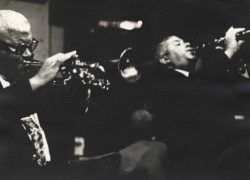Willie Humphrey
Clarinetist Willie Humphrey played with brass bands and traditional New Orleans jazz bands for more than seventy years; with his brother, trumpeter Percy Humphrey, he led the Preservation Hall Jazz Band.

Courtesy of Louisiana State Museum
Percy Humphrey and Willie Humphrey. Marks, Grauman (Photographer)
Born into a legendary musical family, William James Humphrey Jr., a New Orleans jazz and brass band clarinetist, and his brother, trumpeter Percy Humphrey, would leave indelible marks on twentieth-century jazz in New Orleans. “Willie” Humphrey was also a central figure in the brass band tradition of the city, performing with the Excelsior, Eureka, and Young Tuxedo brass bands, among others, during his nearly century-long career. Humphrey is perhaps best remembered for performing with his brother as co-leaders of the Preservation Hall Jazz Band in the final years of their careers.
Humphrey was born in New Orleans on December 29, 1900. A musically precocious youth, he began on violin but soon switched to trumpet under the tutelage of his grandfather, the legendary cornetist Professor James Humphrey, who instructed many of the first generation of musicians who would go on to shape early jazz music. Humphrey’s first professional job was with his father, clarinetist Willie Eli Humphrey, in George McCullum’s band. Stints in the Silver Leaf Orchestra and as leader of a twenty-two-piece orchestra at New Orleans University soon followed.
Humphrey traveled often in his early career, working with bandleader George Fihle to replace Lorenzo Tio Jr. before joining Freddie Keppard’s ensemble and playing with the “White Sox” band in 1919 (led by Lawrence Duhe and featuring King Oliver). In 1920 Humphrey joined Amos Riley’s Tulane Band, after which he began performing regularly with Kid Rena. The year 1925 found Humphrey traveling up the Mississippi River to St. Louis to play with pianist–calliope player–bandleader Fate Marable. In 1932 Humphrey returned to New Orleans and taught at private schools there from 1933 to 1934. During the Great Depression he played in the Works Progress Administration band. In 1935 and 1936 he also toured and recorded with the Mills Blue Rhythm Band, in which Lucky Millinder was a frequent player and sometimes bandleader.
After serving in a navy band during World War II, Humphrey began performing regularly with the Eureka Brass Band. In the 1950s he would appear most often with Paul Barbarin, a partnership that culminated in a tour to New York City in 1955. It was in the 1960s, however, that Humphrey truly hit his musical stride, including recording with a number of different groups for Riverside Records’ Living Legends series. A tour of Europe came in 1967 with Billie and Dede Pierce, and from 1969 on, Humphrey performed with his brother Percy in the Preservation Hall Jazz Band, a partnership that garnered them much attention in the final decades of their lives. In 1974 Humphrey released what would become the most well-received album of his career, New Orleans Clarinet, on the Smoky Mary label. The album included standards like “Little Liza Jane” and a number of popular tunes, including “Pennies from Heaven” and “China Boy.” Humphrey also recorded four albums for CBS as co-leader (with brother Percy) of the Preservation Hall Jazz Band.
Humphrey died on June 7, 1994, in New Orleans. At the time of his death, Humphrey was the oldest performing jazz musician in New Orleans.
